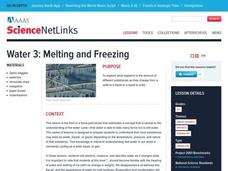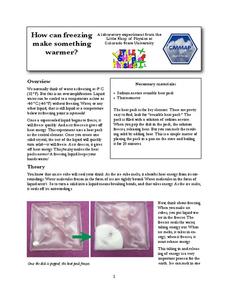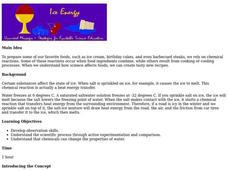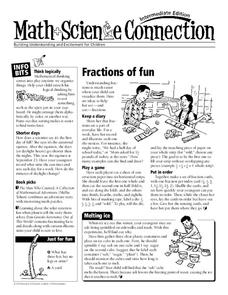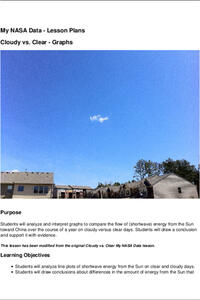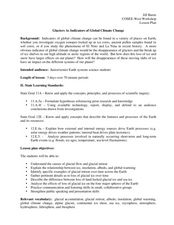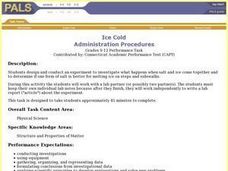Curated OER
Why Do Ice Cubes Melt?
First graders investigate water properties by participating in a hands on experiment. In this ice formation lesson, 1st graders examine real ice cubes in a bowl and identify the reasons why certain cubes melt faster than others. Students...
Curated OER
Water and Ice
Students explore the states of matter. In this physical science lesson, students observe what happens to water when it freezes and record observations. Students then observe ice when it melts and record observations.
Captain Planet Foundation
Solar Cooking Race
Study heat transfer with activities that focus on how heat energy works. Using a solar cooker, ice cubes, and heat transfer bracelets, kids experiment and record what they find by keeping ice cubes cold and vegetables hot.
Curated OER
Ice Melting
Students design investigations to test various materials to prevent heat gain in frozen water. The task assess students' knowledge of scientific inquiry including the following skills: observation, data collection, measurement,...
Curated OER
Physical Properties of Ice
Students explore the different properties of ice. They make predictions and experment with ice. Students discover that ice melts faster under pressure. Students create a flipbook what what happened after each experiment. This...
Curated OER
Melting and Freezing
Students explore how various substances change from a solid to a liquid or from a liquid to a solid and how temperature, pressure and nature play an important role in this process. In this melting and freezing lesson,...
Curated OER
Cold Hard Facts...What Inquiring Minds Will Know
Learners work with "ice" in order to gain a practical application of math concepts that evolve into an inquiry-based study. They determine if the dimensions of the ice make a difference in the way the ice floats in the water.
Curated OER
Water and Ice
Students perform experiments in pairs to visualize the changes in water during freezing and melting. In this properties of water lesson, students use their senses and inquiry tools to understand the changes in state of water. Suggested...
Curated OER
Water 3: Melting and Freezing
Students understand that most substances may exist as solids, liquids, or gases depending on the temperature, pressure, and nature of that substance. This knowledge is critical to understanding that water in our world is constantly...
Curated OER
Slippery, Slippery Ice
Students investigate how salt affects ice by experimenting in class. In this water properties instructional activity, students utilize a penny, salt and pans of ice to examine the sliding ability of a penny across a layer of ice....
Colorado State University
How Can Freezing Make Something Warmer?
Crazy fact—freezing liquid actually gives off heat! Young scholars investigate the transfer of energy when liquids freeze using a chemical heat pack. The heat pack gives off heat as its liquid core freezes.
Discovery Education
Cool It!
Adjust the melting time of ice without varying the temperature! Learners experiment with different materials to decide how the materials affect the rate an ice cube melts. They then connect their findings to the conductivity of each...
Center for Learning in Action
Water—Changing States (Part 1)
Here is part one of a two-part lesson in which scholars investigate the changing states of water—liquid, solid, and gas. With grand conversation and up to three demonstrations, learners make predictions about what they think will happen...
Center for Learning in Action
Water – Changing States (Part 2)
Here is part two of a two-part lesson plan in which scholars investigate the changing states of water—liquid, solid, and gas—and how energy from heat changes its molecules. With grand conversation, two demonstrations, and one...
Curated OER
Ice Energy
Students investigate how salt affects the state of ice. In this ice cream making instructional activity, students change the freezing temperature by adding salt and observing the results. Students use experimentation and comparison to...
Virginia Department of Education
The Law of Conservation of Matter
The Law of Conservation of Matter can be complex for young scientists to fully grasp. Use this experiment to help simplify the process as pupils perform two experiments to determine mass: one that melts a substance and the other that...
Virginia Department of Education
States of Matter
Scientists have been studying exothermic reactions before they were cool. The lesson begins with a discussion and a demonstration of heat curves. Scholars then determine the heat of fusion of ice and the heat needed to...
Resources for Educators
Fractions of Fun
Reinforce concepts and encourage learner engagement with a collection of math games, science experiments, and cross curricular activities. In one fun resource, learners sort objects, keep a diary of everyday fractions, play a game using...
It's About Time
How Do Plate Tectonics and Ocean Currents Affect Global Climate?
What do plate tectonics and ocean currents have to do with global climate? This fourth installment in a six-part series focuses on how plate tectonics and ocean currents affect global climate, both now and in the past, outlines an...
NASA
Cloudy vs. Clear - Graphs
Explore the link between solar energy and cloud cover using real data from NASA from China! Future climatologists analyze and interpret graphs of solar energy on clear and cloudy days using a literacy cube. Investigators draw conclusions...
Curated OER
Earthquakes
Students observe the melting of ice. In this phase change lesson, students observe ice as it melts. They discuss the process and create a Venn diagram comparing water and ice.
Curated OER
Ocean Currents
Pupils determine how water and wind affect ocean currents. In this science investigation lesson, students follow the provided steps to enable them to consider how explorers may have used ocean currents to their advantage.
Curated OER
Glaciers As Indicators of Global Climate Change
Students research about glacial ice melting on the four major spheres of the Earth. In this earth science instructional activity, students explain how this process relates to global warming. They create a presentation and share their...
Curated OER
Ice Cold
Young scholars design and conduct an experiment to investigate what happens when salt and ice come together and to determine if one form of salt is better for melting ice on steps and sidewalks.







